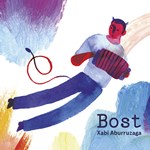

Back in 2016 we talked about the city of San Sebastian, and we made an extensive introduction in the history and folk music from the Spanish Basque Country.[59] In that article we mentioned the diatonic accordion, or trikitixa, in Basque language, and we also listed some of its acknowledged performers (J.Tapia, I.Plaza, K.Junquera, A.Barandiaran, G.Hermosa,...), as one of the main highlights in the local traditional music. Although being part of an ancient Basque music heritage, the fact is that in the rest of Spain it was not until the 1990s that we started getting truly familiar with the trikitixa, and probably it was mostly thanks to the trikitilari Kepa Junquera (Bilbao, 1965), who at the time became one of the young promising folk artists in those days of revival of Spain’s Celtic and trad music in general.
It is sad that Kepa suffered a stroke back in December 2018, that has kept him away from the music business (at least until today in early 2020). But it is thanks to artists such as him and his broad musical projects (recordings & books, shows, tours,...) that the world of Basque trad music has transcended into the highest levels of popularity in its whole history.
The diatonic accordionist Xabi Aburruzaga was born in 1978 in the Basque town of Portugalete, and in 2019 has published his 5th album, ‘Bost’, which unlike the previous album (‘Keltik’), inspired by the world of Celtic music, this time, the motivation comes from within, sounds of his recent years’ experiences, some woven with lyrics.
The album starts with a ‘Reel Québécois’, a merry tune that establishes that cultural (maybe even political), connecting bridge between the Basque traditions and the ones from the French Canadian province of Quebec. Similarly as Kepa Junquera did back in his early works, the connection happens through the collaboration with Canadian artists, such Paul Audy (guitar), Nicolas Babineau (fiddle & feet), and of course Yves Lambert (accordion, Jew’s harp & vocals), former founding member of the band La Bottine Souriante.
In the pieces ‘Bilbao-La Robla’ and ‘Waltz for Velilla’, he reminisces of the trips he made as child to the land of his grandparents, Palencia (province in Castilla y Leon, central-north Spain), and for the waltz he also features the collaboration of the Castilian duo Fetén Fetén, Diego Galaz (fiddle, mandolin), and Jorge Arribas (accordion).

But his travels and memories also go to places such as: Palestine, in the tunes ‘Non da Palestine?’ & ‘Nadirren giltza’, Galicia (NW Spain), in ‘Meigas’ with the bagpiper Anxo Lorenzo and the female group of ‘pandereteiras’ (voices & tambourines) Tanxugeiras as guest artists, and the United States, in ‘Zortzi Jauzi’, a blend between Basque folk and blue grass or country, a tribute to the diaspora that Xavi met in the Basque Centers across the USA, and The Americas in general.
Xavi Aburruzaga’s band is composed of: Aitor Uribarri (tambourine), Koldo Uriarte (keyboards), Jon Cañaveras (double bass), Eriz Pérez (guitar), Arkaitz Pascuas & Nagore de las Cuevas (dancers). Nevertheless, in this ‘Bost’ CD there is an endless list of collaborating artists (in addition to all the previously mentioned ones) which extends to : Calum Stwart (uilleann pipes in the song ‘Bost’), Xavier Zeberio (fiddle in ‘Bost’, and nyckelharpa in ‘Atxarre’), Gorka Urmeneta (alboka), Argibel Euba & Iñigo Olazabal (txalaparta), Javier Pérez (trumpet), Alberto Urretxo (trombone), Ivo Makinen (clarinet),...., and many many others.
I must say that ‘Bost’ is a great album, full of exciting and happy tunes, with splendid and diverse instrumental constructions, and the ‘ahotsa’ (voice, in Basque) of so many talented singers, all together displaying the musical universe that orbits around the diatonic accordion of Xavi Aburruzaga, and perpetuate the folk revival that big-banged three decades ago in the Basque Country.
Photo Credits:
(1) View of San Sebastian’s La Concha Bay from the top of Monte Igueldo (by P. Fernández);
(2)-(3) Xabi Aburruzaga,
(4) Korrontzi,
(5) Kepa Junkera
(unknown/website).